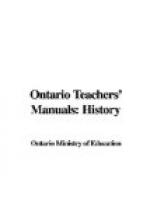A taste of the more serious study of history may be given by asking the pupils a few not very difficult questions that they can answer only by combining facts contained in several stories. For example, in the chapters selected for Form III, Junior Grade, the answer can be found to a question about the explorers of Canada, the order of their visits, and a comparison of their work; to another question about the expansion of Canada from the little part of Quebec first visited to the whole of British North America.
It is unnecessary, perhaps, to add that the emphasis in Form III history should be still very largely on biography, so as to influence the forming of moral ideals by concrete examples.
FORM IV
Although the pupils have now had some experience in the use of the History Reader, yet that is no reason why oral teaching should be discarded in Form IV history, any more than in arithmetic or geography. It is scarcely a high estimate to have of history, to think that pupils of this age can grasp even the simpler lines of development in history without guidance from the teacher. Hence it is necessary for the attainment of good results, that many of the lessons should be taught orally before the pupils are asked to study their books. The aim of the teaching should be not merely the acquisition of facts, but the welding of them together in a sequence of cause and effect, and the pupils at this stage can scarcely be expected to do that for themselves.
In preparing for a lesson in Form IV history, the teacher should analyse the incidents of the period to be studied, should see how certain causes have led to certain results, and should be sure enough of the facts to have little recourse to the text-book while teaching. It does not look like fair play to expect a class to answer questions that the teacher cannot answer without consulting the text. On the other hand, it is refreshing to see the interest aroused in a class by a teacher who thinks enough of the subject to be able to teach it without constant reference to the text-book. Therefore, let the oral method be here again the chief dependence of the teacher. In such a lesson, for example, as that on the Intercolonial Railway (see p. 82) no book is needed—only the map and the black-board.
TRAINING IN USE OF TEXT-BOOK
However, as the pupils must learn, for their own profit in after years, how to read history without a guiding hand, they need training in the use of the text-book. The chief line on which such training may proceed is to have the pupils search out the answers to definite questions. Any one who has searched for material on a certain topic will appreciate the good results that have come in the way of added knowledge and increased interest. The topics at first should be quite simple, gradually increasing in breadth. A few suggestions for such work are given below; they may be called examination questions to be answered with the help of the text-book:




